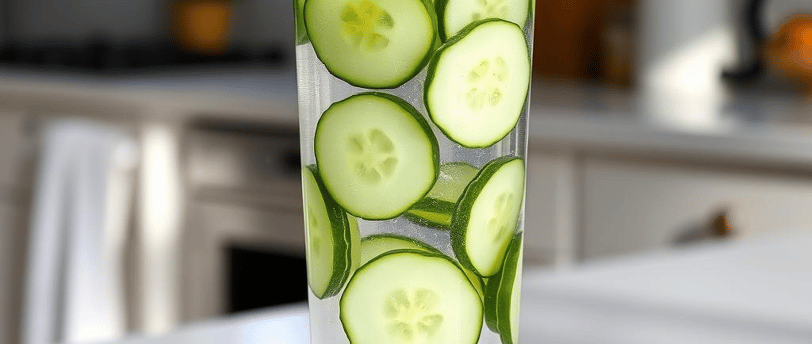Stay Hydrated to Keep Blood Flowing Smoothly – Water Helps Prevent Thickening of the Blood
🧘WELLNESS TIPSHEART HEALTH & CIRCULATION❤️


In the realm of health and wellness, the essential role of water cannot be overstated. While the importance of hydration may often be relegated to simple advice, emerging scientific evidence continues to unveil the profound impacts of proper hydration on our overall bodily functions. Among the many reasons to stay hydrated, one of the most critical is its ability to prevent the thickening of the blood – a factor key to maintaining cardiovascular health.
Understanding Blood Thickness
Blood viscosity refers to the thickness and stickiness of blood as it flows through the arteries and veins. When blood is too thick, it can create problems; it tends to flow less efficiently, leading to an increased risk of cardiovascular conditions. Thick blood can elevate blood pressure, strain the heart, and increase the likelihood of clot formation, which can result in critical health issues such as strokes or heart attacks.
The Role of Hydration in Blood Viscosity
Drinking adequate amounts of water plays a fundamental role in maintaining optimal blood viscosity. Scientific evidence shows that dehydration can lead to an increase in blood thickness, primarily due to a reduction in plasma volume. Plasma, the fluid portion of blood, consists primarily of water and is responsible for transporting nutrients, hormones, and waste products. When the body is dehydrated, the proportion of plasma decreases, leading to a higher concentration of cells and proteins in the blood, consequently increasing viscosity.
A study published in the "American Journal of Clinical Nutrition" found that even mild dehydration can elevate blood viscosity and impact cardiovascular function. Participants in the study experienced significant changes in hematocrit levels—a measure of the proportion of blood volume that is occupied by red blood cells—when dehydrated.
Benefits of Staying Hydrated
1. Improved Circulation
The first and foremost benefit of hydration is improved circulation. Adequate fluid intake ensures that blood can flow freely, transporting critical nutrients and oxygen to organs and tissues. The heart can pump blood more efficiently, reducing the strain during physical activity and everyday functions.
2. Enhanced Nutrient Transport
Hydration enhances the transportation of nutrients and electrolytes. Water facilitates the movement of essential vitamins, minerals, and nutrients from digested food through the bloodstream. This nutrient delivery system is integral not only to energy production but also to maintaining tissue health and supporting cellular functions.
3. Temperature Regulation
Hydration plays a critical role in maintaining body temperature. When the body is well-hydrated, it can effectively regulate temperature through sweating and respiration. Dehydration can hinder this process, resulting in increased body temperature, which can lead to complications during physical exertion.
4. Joint Lubrication
Adequate hydration is essential for maintaining the lubrication of joints. Water helps to keep synovial fluid at optimal levels, which is critical for reducing friction between joints and allowing for greater mobility. Dehydrated individuals may experience joint stiffness or pain, which can be exacerbated during physical activities.
What the Scientific Evidence Says
Multiple research studies have correlated hydration levels with blood viscosity, cardiovascular health, and overall wellness. A pivotal study in the "Journal of Hydration Science" indicates that even a 2% reduction in body weight due to dehydration can substantially increase blood viscosity, underscoring the importance of maintaining fluid levels in hot weather or during vigorous exercise.
Moreover, a 2021 meta-analysis published in the "European Journal of Nutrition" reaffirmed that habitual water intake correlates with lower incidence rates of cardiovascular diseases. This comprehensive review highlighted that optimal hydration can help modulate various body systems to keep blood flowing smoothly, further reinforcing the link between hydration and cardiovascular health.
How Much Water Do You Need?
The recommended water intake can vary based on various factors, including age, gender, activity level, and climate. A common guideline suggests drinking at least eight 8-ounce glasses (about 2 liters) daily, often referred to as the "8x8 rule." However, individuals should adjust their intake based on personal needs and activity levels.
Some tips for ensuring adequate hydration include:
Carry a reusable water bottle: Having water on hand makes it easier to sip throughout the day.
Monitor your fluid intake: Tracking your water consumption can help identify whether you are meeting your hydration goals.
Consume hydrating foods: Fruits and vegetables, such as watermelon, cucumbers, and oranges, can complement your daily fluid intake.
Be mindful of physical activity: Increase your water consumption during workouts or in high-temperature environments to counteract fluid loss from sweating.
Recognizing the Signs of Dehydration
Awareness of dehydration symptoms is crucial for maintaining proper hydration levels. Common signs include:
Thirst
Dry mouth
Dark yellow urine
Fatigue or dizziness
Confusion or irritability
If you or someone else is experiencing these symptoms, it's essential to rehydrate quickly to avoid further complications.
Conclusion
Staying hydrated is a fundamental and often overlooked component of health that has a direct impact on blood viscosity and overall cardiovascular health. Scientific evidence supports the notion that sufficient water intake can effectively prevent the thickening of the blood, leading to improved circulation, enhanced nutrient transport, and overall wellness.
By recognizing the importance of hydration and making it a priority in your daily life, you can help ensure your body functions optimally. Remember, simple changes can lead to substantial benefits; nurture your body with adequate water, and it will reward you with better health and vitality. Stay hydrated, and keep your blood flowing smoothly!
